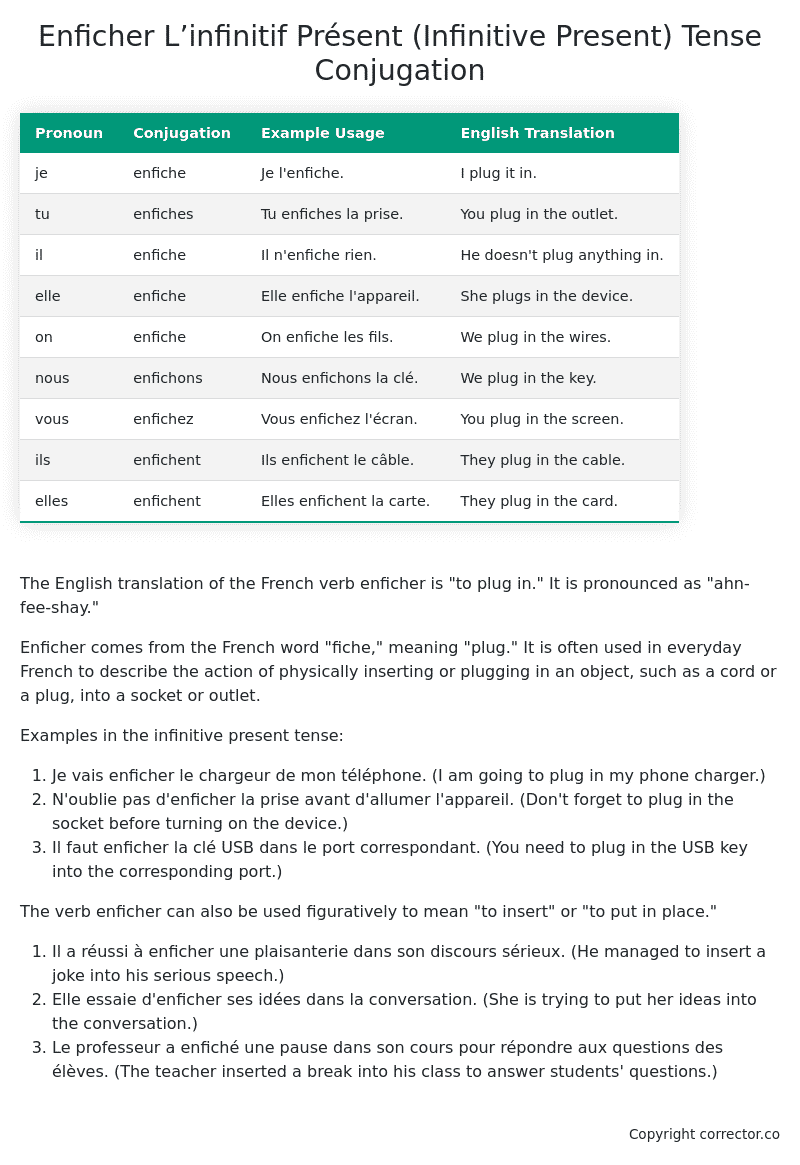L’infinitif Présent (Infinitive Present) Tense Conjugation of the French Verb enficher
Introduction to the verb enficher
The English translation of the French verb enficher is “to plug in.” It is pronounced as “ahn-fee-shay.”
Enficher comes from the French word “fiche,” meaning “plug.” It is often used in everyday French to describe the action of physically inserting or plugging in an object, such as a cord or a plug, into a socket or outlet.
Examples in the infinitive present tense:
- Je vais enficher le chargeur de mon téléphone. (I am going to plug in my phone charger.)
- N’oublie pas d’enficher la prise avant d’allumer l’appareil. (Don’t forget to plug in the socket before turning on the device.)
- Il faut enficher la clé USB dans le port correspondant. (You need to plug in the USB key into the corresponding port.)
The verb enficher can also be used figuratively to mean “to insert” or “to put in place.”
- Il a réussi à enficher une plaisanterie dans son discours sérieux. (He managed to insert a joke into his serious speech.)
- Elle essaie d’enficher ses idées dans la conversation. (She is trying to put her ideas into the conversation.)
- Le professeur a enfiché une pause dans son cours pour répondre aux questions des élèves. (The teacher inserted a break into his class to answer students’ questions.)
Table of the L’infinitif Présent (Infinitive Present) Tense Conjugation of enficher
| Pronoun | Conjugation | Example Usage | English Translation |
|---|---|---|---|
| je | enfiche | Je l’enfiche. | I plug it in. |
| tu | enfiches | Tu enfiches la prise. | You plug in the outlet. |
| il | enfiche | Il n’enfiche rien. | He doesn’t plug anything in. |
| elle | enfiche | Elle enfiche l’appareil. | She plugs in the device. |
| on | enfiche | On enfiche les fils. | We plug in the wires. |
| nous | enfichons | Nous enfichons la clé. | We plug in the key. |
| vous | enfichez | Vous enfichez l’écran. | You plug in the screen. |
| ils | enfichent | Ils enfichent le câble. | They plug in the cable. |
| elles | enfichent | Elles enfichent la carte. | They plug in the card. |
Other Conjugations for Enficher.
Le Present (Present Tense) Conjugation of the French Verb enficher
Imparfait (Imperfect) Tense Conjugation of the French Verb enficher
Passé Simple (Simple Past) Tense Conjugation of the French Verb enficher
Passé Composé (Present Perfect) Tense Conjugation of the French Verb enficher
Futur Simple (Simple Future) Tense Conjugation of the French Verb enficher
Futur Proche (Near Future) Tense Conjugation of the French Verb enficher
Plus-que-parfait (Pluperfect) Tense Conjugation of the French Verb enficher
Passé Antérieur (Past Anterior) Tense Conjugation of the French Verb enficher
Futur Antérieur (Future Anterior) Tense Conjugation of the French Verb enficher
Subjonctif Présent (Subjunctive Present) Tense Conjugation of the French Verb enficher
Subjonctif Passé (Subjunctive Past) Tense Conjugation of the French Verb enficher
Subjonctif Imparfait (Subjunctive Imperfect) Tense Conjugation of the French Verb enficher
Subjonctif Plus-que-parfait (Subjunctive Pluperfect) Tense Conjugation of the French Verb enficher
Conditionnel Présent (Conditional Present) Tense Conjugation of the French Verb enficher
Conditionnel Passé (Conditional Past) Tense Conjugation of the French Verb enficher
L’impératif Présent (Imperative Present) Tense Conjugation of the French Verb enficher
L’infinitif Présent (Infinitive Present) Tense Conjugation of the French Verb enficher (this article)
Struggling with French verbs or the language in general? Why not use our free French Grammar Checker – no registration required!
Get a FREE Download Study Sheet of this Conjugation 🔥
Simply right click the image below, click “save image” and get your free reference for the enficher L’infinitif Présent tense conjugation!

Enficher – About the French L’infinitif Présent (Infinitive Present) Tense
Forming the Infinitive Present
Common Everyday Usage Patterns
As a Verb’s Dictionary Form
After Modal Verbs
As an Imperative
In Infinitive Clauses
Interactions with Other Tenses
Present Tense
Future Tense
Conditional Tense
Passé Composé
Imperfect Tense
Subjunctive and Conditional Moods
Summary
Want More?
I hope you enjoyed this article on the verb enficher. Still in a learning mood? Check out another TOTALLY random French verb conjugation!


